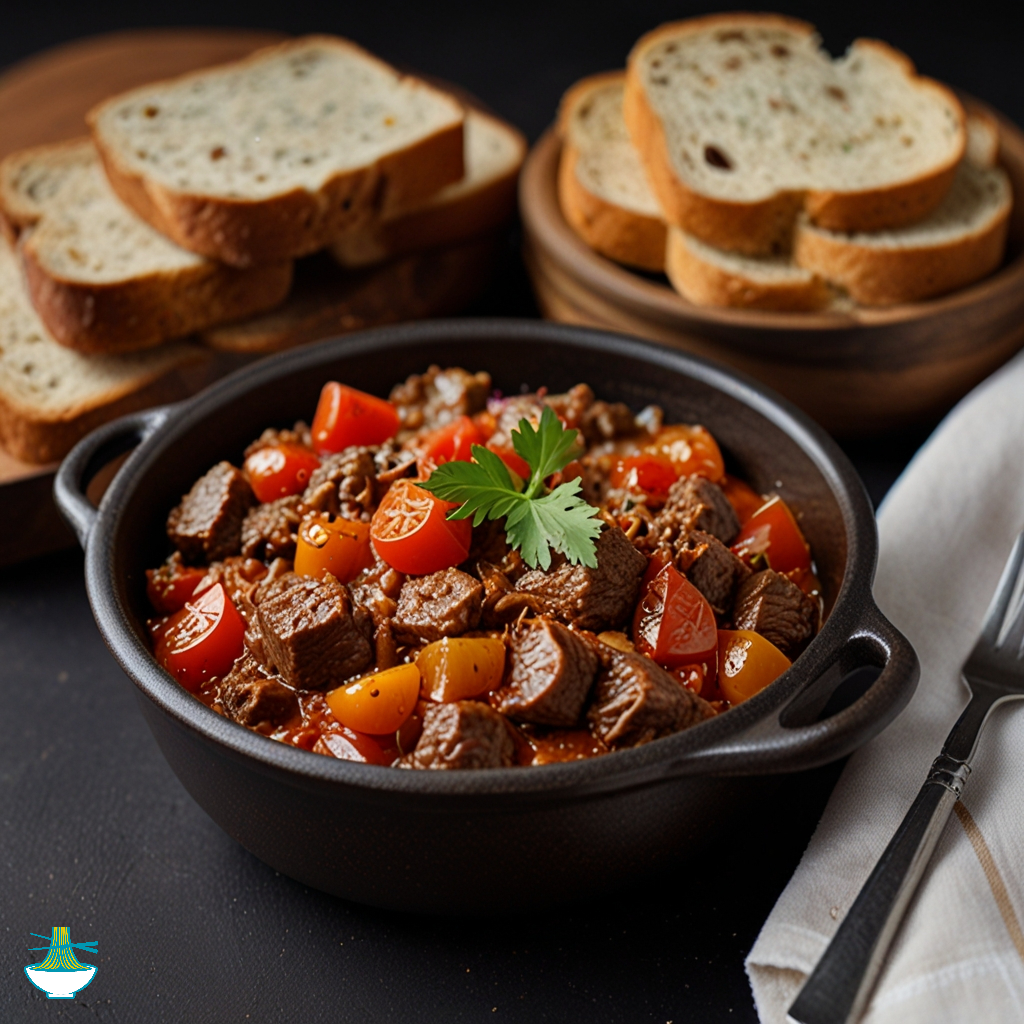Tutmaç is a flavorful dish featuring chopped lamb or beef cooked with tomatoes, onions, and spices, often served alongside bread. Originating from Turkish cuisine, it showcases the rich culinary heritage of the region, known for its savory meat dishes and vibrant flavors. With a history rooted in traditional cooking methods passed down through generations, Tutmaç offers a delicious blend of aromatic spices and tender meat, making it a beloved dish enjoyed by many.
Ingredients:
- 500g lamb or beef, chopped
- 2 tomatoes, diced
- 1 onion, finely chopped
- 2 cloves garlic, minced
- 2 tablespoons olive oil
- 1 teaspoon paprika
- 1/2 teaspoon cumin
- Salt and pepper to taste
- Fresh parsley for garnish
- Bread for serving
Method:
1. Heat olive oil in a pan over medium heat.
2. Add chopped onion and minced garlic, sauté until softened.
3. Add chopped lamb or beef to the pan, cook until browned.
4. Stir in diced tomatoes, paprika, cumin, salt, and pepper.
5. Simmer over low heat for 20-25 minutes, until the meat is tender and the sauce has thickened.
6. Serve hot, garnished with fresh parsley, and accompanied by bread. Enjoy your delicious Tutmaç!
Nutrition Value:
1. 500g lamb or beef, chopped:
- Calories: Approximately 1300 kcal (varies based on type and cut)
- Carbohydrates: 0g
- Protein: Approximately 100g
- Fat: Approximately 100g
- Sodium: Varies, typically around 75-100mg per 100g
- Cholesterol: Varies, typically around 75-100mg per 100g
- Nutritional Benefits: Rich in protein, iron, zinc, and B vitamins, essential for muscle health, energy production, and overall well-being.
2. 2 tomatoes, diced:
- Calories: Approximately 50 kcal (per medium-sized tomato)
- Carbohydrates: Approximately 10g
- Protein: Approximately 2g
- Fat: Approximately 0.5g
- Sodium: Approximately 5mg
- Cholesterol: 0mg
- Nutritional Benefits: High in vitamin C, potassium, antioxidants, and fiber, supporting immune function, heart health, and digestion.
3. 1 onion, finely chopped:
- Calories: Approximately 45 kcal (per medium-sized onion)
- Carbohydrates: Approximately 11g
- Protein: Approximately 1g
- Fat: Approximately 0g
- Sodium: Approximately 5mg
- Cholesterol: 0mg
- Nutritional Benefits: Contains antioxidants, vitamins C and B6, and fiber, contributing to immune support, heart health, and digestive health.
4. 2 cloves garlic, minced:
- Calories: Approximately 10 kcal (per clove)
- Carbohydrates: Approximately 2g
- Protein: Approximately 0.5g
- Fat: Approximately 0g
- Sodium: Approximately 1mg
- Cholesterol: 0mg
- Nutritional Benefits: Rich in allicin, a compound with potential health benefits including immune support, heart health, and anti-inflammatory properties.
5. 2 tablespoons olive oil:
- Calories: Approximately 240 kcal
- Carbohydrates: 0g
- Protein: 0g
- Fat: Approximately 28g
- Sodium: Approximately 0mg
- Cholesterol: 0mg
- Nutritional Benefits: High in monounsaturated fats, antioxidants, and vitamin E, promoting heart health, reducing inflammation, and supporting skin health.
6. 1 teaspoon paprika:
- Calories: Approximately 6 kcal
- Carbohydrates: Approximately 1g
- Protein: Approximately 0.3g
- Fat: Approximately 0.3g
- Sodium: Approximately 1mg
- Cholesterol: 0mg
- Nutritional Benefits: Contains antioxidants, vitamins A and E, and capsaicin, contributing to eye health, immune support, and metabolism.
7. 1/2 teaspoon cumin:
- Calories: Approximately 4 kcal
- Carbohydrates: Approximately 0.5g
- Protein: Approximately 0.2g
- Fat: Approximately 0.2g
- Sodium: Approximately 1mg
- Cholesterol: 0mg
- Nutritional Benefits: Rich in antioxidants, iron, and digestive aids, supporting digestion, immune function, and blood sugar control.
8. Salt and pepper to taste:
- Calories: Negligible
- Carbohydrates: Negligible
- Protein: Negligible
- Fat: Negligible
- Sodium: Varies based on usage
- Cholesterol: 0mg
- Nutritional Benefits: Salt provides sodium, necessary for fluid balance and nerve function. Pepper contains antioxidants and may aid digestion and metabolism.
9. Fresh parsley for garnish:
- Calories: Approximately 1 kcal (per tablespoon)
- Carbohydrates: Approximately 0.2g
- Protein: Approximately 0.1g
- Fat: Approximately 0g
- Sodium: Approximately 1mg
- Cholesterol: 0mg
- Nutritional Benefits: Rich in vitamins A, C, and K, antioxidants, and folate, supporting bone health, immune function, and detoxification.
10. Bread for serving:
- Nutritional content varies based on the type of bread chosen (e.g., whole wheat, white, etc.)
- Typically provides carbohydrates, some protein, and minimal fat
- Nutritional Benefits: Provides energy from carbohydrates and may contribute to fiber intake depending on the type chosen. Choose whole grain bread for added fiber and nutrients.


Comments